-
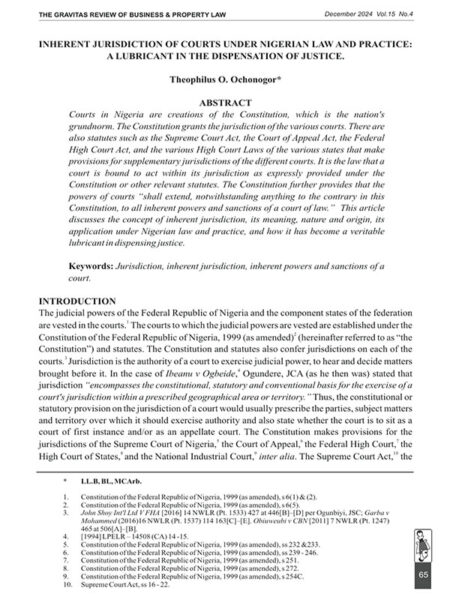
Inherent Jurisdiction of Courts under Nigerian Law and Practice: A Lubricant in the Dispensation of Justice
0₦2,500.00Theophilus Ochonogor in his article, Inherent Jurisdiction of Courts under Nigerian Law and Practice: A Lubricant in the Dispensation of Justice, discusses the concept of inherent jurisdiction, its meaning, nature and origin, its application under Nigerian law and practice, and how it has become a veritable lubricant in the dispensation of justice. Courts in Nigeria are creations of the Constitution, which is the nation’s grundnorm. The Constitution grants the jurisdictions of the various courts. There are also such statutes as the Supreme Court Act, the Court of Appeal Act, the Federal High Court Act and the various High Court Laws of the various states which make provisions for supplementary jurisdictions of the different courts. It is the law that a court is bound to act within its jurisdiction as expressly provided under the Constitution or other relevant statute. The Constitution further provides that the powers of courts “shall extend, notwithstanding anything to the contrary in this Constitution, to all inherent powers and sanctions of a court of law.”
-
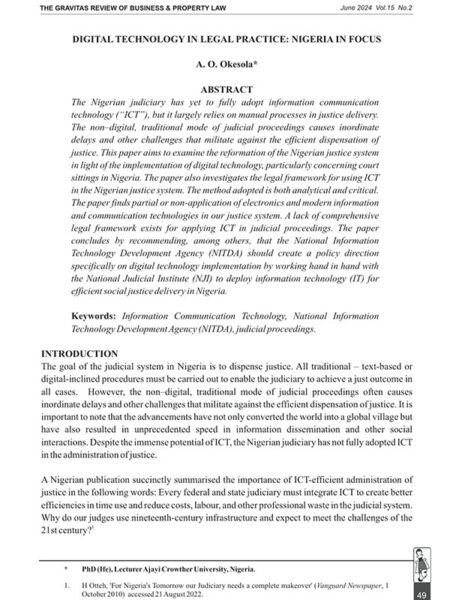
Digital Technology in Legal Practice: Nigeria in Focus
0₦2,500.00Dr. A.O. Okesola, in his article, Digital Technology in Legal Practice: Nigeria in Focus, examines the reformation of the Nigeria justice system in the light of the implementation of digital technology, particularly as it pertains to court sittings in Nigeria. Okesola also investigates the legal framework for the use of ICT in the Nigeria justice system. The method adopted is both analytical and critical. Okesola finds that there is partial or non – application of electronics and modern information and communication technologies in our justice system. There is also non – existing comprehensive legal framework for the application of ICT in judicial proceedings. Okesola concludes by recommending among others that the National Information Technology Development Agency (NITDA) should create a policy direction specifically on digital technology implementation by working hand in hand with the National Judicial Institute (NJI) to deploy information technology (IT) for efficient social justice delivery in Nigeria.
-
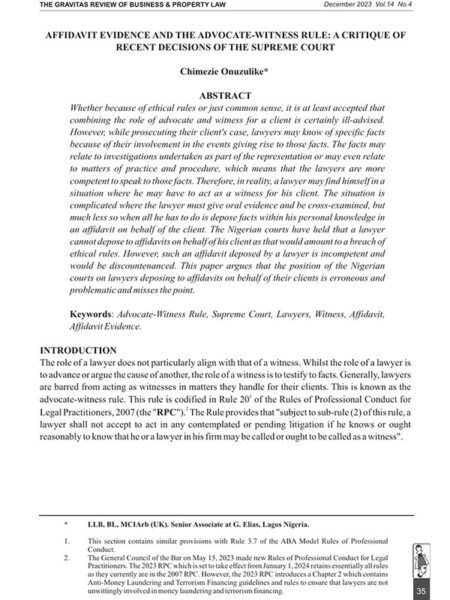
Affidavit Evidence and The Advocate-Witness Rule: A Critique of the Recent Decisions of the Supreme Court
0₦2,500.00Chimezie Onuzulike, in his article, Affidavit Evidence and The Advocate-Witness Rule: A Critique of the Recent Decisions of the Supreme Court, examines the ethical issues arising when counsel combines the role of advocate and witness for a client. Onuzulike posits that in the course of prosecuting their client’s case, lawyers may know of certain facts because of their involvement in the events giving rise to those facts. The facts may relate to investigations undertaken as part of the representation or may even relate to matters of practice and procedure, which means that the lawyers are more competent to speak to those facts. Therefore, in reality, a lawyer may find himself in a situation where he may have to act as a witness for his client. The situation is complicated where the lawyer is required to give oral evidence and be cross-examined, but much less so when all he has to do is depose to facts within his personal knowledge in an affidavit on behalf of the client. The Nigerian courts have not only held that a lawyer cannot depose to affidavits on behalf of his client as that would amount to a breach of ethical rules, but also that such an affidavit deposed to by a lawyer is incompetent and would be discountenanced. Onuzulike argues that the position of the Nigerian courts on lawyers deposing to affidavits on behalf of their clients is erroneous, problematic and misses the point.
-
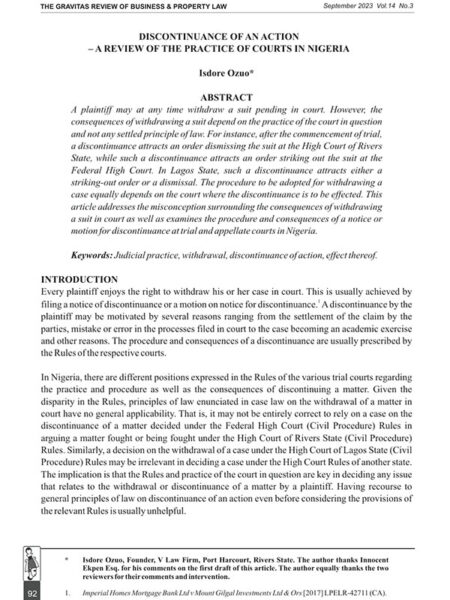
Discontinuance of an Action – A Review of the Practice of Courts in Nigeria
0₦2,500.00Isdore Ozuo, in his article, Discontinuance of an Action – A Review of the Practice of Courts in Nigeria, analyses the legal provisions on the right of a plaintiff to discontinue an action in the different strata of court. A plaintiff may at any time withdraw a suit pending in court. However, the consequences of withdrawing a suit depend on the practice of the court in question and not any settled principle of law. For instance, after the commencement of trial, a discontinuance attracts an order dismissing the suit at the High Court of Rivers State, while such a discontinuance attracts an order striking out the suit at the Federal High Court. In Lagos State, such a discontinuance attracts either a striking out order or a dismissal. The procedure to be adopted for withdrawing a case equally depends on the court where the discontinuance is to be effected. The article addresses the misconception surrounding the consequences of withdrawing a suit in court as well as examines the procedure and consequences of a notice or motion for discontinuance at trial and appellate courts in Nigeria.
-

Admissibility of Public Documents and Photocopies of Certified True Copies of Public Documents
0₦2,500.00Professor Joseph Abugu, SAN, in this article, Admissibility of Public Documents and Photocopies of Certified True Copies of Public Documents, examines two critical vexed issues on the admissibility of public documents. The first interrogates what qualifies as a public document within the provisions of the Evidence Act 2011. The second addresses the admissibility of photocopies of certified true copies of public documents. Professor Abugu posits that the essential quality of a public document must be ascertained by a conjunctive reading of sections 102 and 104 of the Evidence Act which specifies that the document must be one being kept under legal obligation by a public authority with open access by members of the public who seek to obtain a copy thereof and that routine communications of government agencies and statutory bodies do not so qualify. He also finds that the current exposition of the law on the admissibility of photocopies of certified true copies of public companies is as articulated in the 1969 decision of the Supreme court in Minister of Lands v. Azikiwe (SC) as applied in Ogboru v. Uduaghan (CA) and affirmed by the Supreme Court in Emeka v. Chuba-Ikpeazu & Ors. and in Oboh & Anr v. FNL Ltd.
-
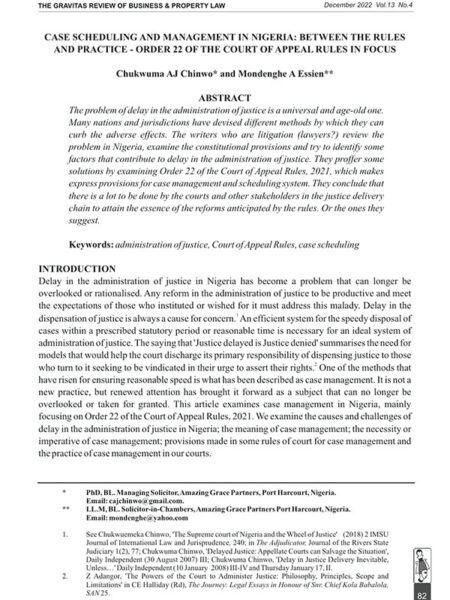
Case Scheduling and Management in Nigeria: Between the Rules and Practice – Order 22 of the Court of Appeal Rules in Focus
0₦2,500.00Dr Chukwuma Chinwo and Mondenghe Essien of the Amazing Grace Partners, Port Harcourt, Nigeria, in their article, Case Scheduling and Management in Nigeria: Between the Rules and Practice – Order 22 of the Court of Appeal Rules In Focus, note that the problem of delay in the administration of justice is a universal and age-old one. Many nations and jurisdictions have devised different methods by which they can curb the adverse effects. Chinwo and Essien review the problem in Nigeria, examine the constitutional provisions and identify some factors contributing to delay in the administration of justice. They proffer some solutions by examining Order 22 of the Court of Appeal Rules, 2021, which makes express provisions for case management and scheduling. They conclude that there is a lot to be done by the courts and other stakeholders in the justice delivery chain to attain the essence of the reforms anticipated by the rules.
-
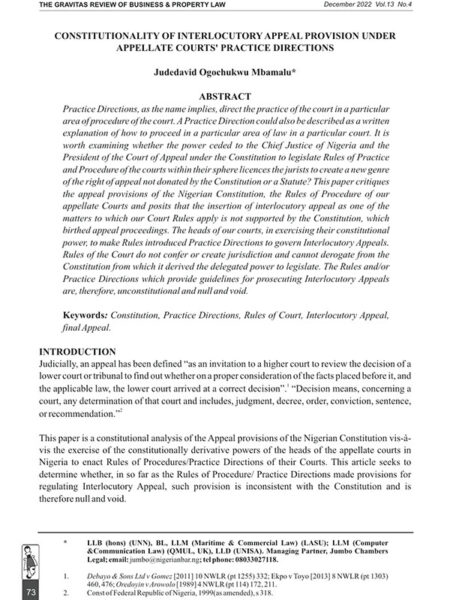
Constitutionality of Interlocutory Appeal Provision Under Appellate Courts’ Practice Directions
0₦2,500.00Dr Judedavid Mbamalu, Managing Partner, Jumbo Chambers, in his article, Constitutionality of Interlocutory Appeal Provision Under Appellate Courts’ Practice Directions, explains that Practice Directions direct the practice of the court in a particular area of procedure of the court. He examines whether the power ceded to the Chief Justice of Nigeria and the President of the Court of Appeal under the Constitution to legislate Rules of Practice and Procedure of the courts within their sphere, licenses the jurists to create a new genre of a right of appeal not donated by the Constitution or a Statute? He critiques the appeal provisions of the Nigerian Constitution and the Rules of Procedure of our appellate Courts. He posits that the insertion of interlocutory appeal, as one of the matters to which our Court Rules apply, is not supported by the Constitution, which birthed appeal proceedings.
-
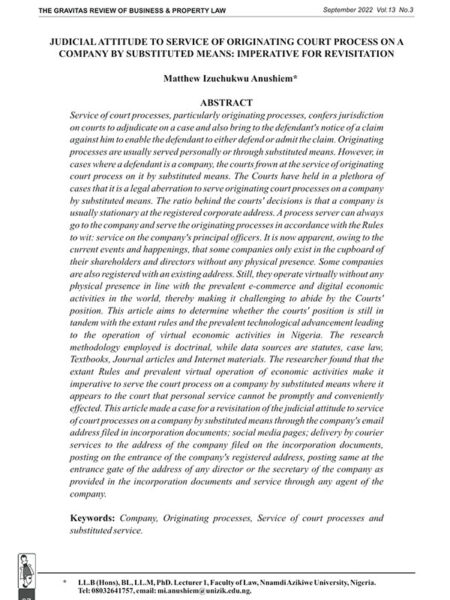
Judicial Attitude to Service of Originating Court Process on a Company by Substituted Means: Imperative for Revisitation
0₦2,500.00Dr Mathew Anushiem of the Faculty of Law, Nnamdi Azikiwe University, Nigeria, in his article, Judicial Attitude to Service of Originating Court Process on a Company by Substituted Means: Imperative for Revisitation, explains that the service of court processes, particularly originating processes, confers jurisdiction on courts to adjudicate on a case and also bring to the defendant’s notice of a claim against him to enable the defendant to either defend or admit the claim. Originating processes are usually served personally or through substituted means. However, in cases where a defendant is a company, the courts frown at the service of originating court process on it by substituted means. The ratio behind the courts’ decisions is that a company is usually stationary at the registered corporate address. A process server can always go to the company and serve the originating processes in accordance with the Rules to wit: service on the company’s principal officers. Given current happenings, the nature of some businesses and technological advancement, Dr Anushiem posits that there is the need to revisit the Rules and judicial attitude to bring them in tandem with modern trends.
-
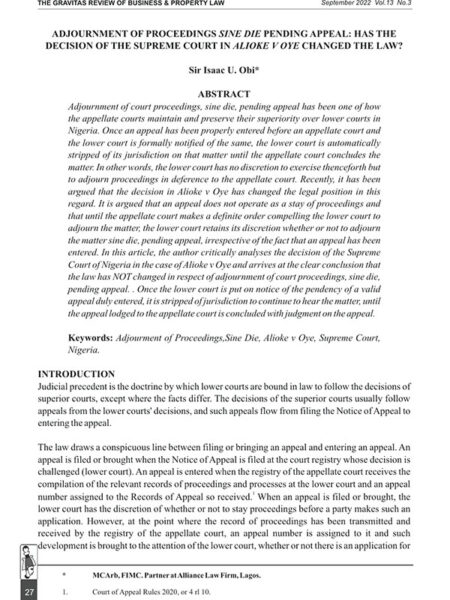
Adjournment of Proceedings Sine Die Pending Appeal: Has the Decision of the Supreme Court in Alioke V Oye Changed the Law?
0₦2,500.00Sir Isaac Obi, Partner at Alliance Law Firm, in his article, Adjournment of Proceedings Sine Die Pending Appeal: Has the Decision of the Supreme Court in Alioke V Oye Changed the Law? explains that adjournment of court proceedings, sine die, pending appeal has been one of the ways the appellate courts maintain and preserve their superiority over lower courts in Nigeria. Once an appeal has been properly entered before an appellate court and the lower court is formally notified, it is automatically stripped of its jurisdiction on that matter until the appellate court concludes the matter. Recently, it has been argued that the decision of the Supreme Court in Alioke v Oye has changed the law. It is argued that an appeal does not operate as a stay of proceedings and that until the appellate court makes a definite order compelling the lower court to adjourn the matter, the lower court retains its discretion whether or not to adjourn the matter sine die, pending appeal, irrespective of the fact that an appeal has been entered. Sir Obi critically analyses the decision in Alioke v Oye to see whether the law has really changed.
-
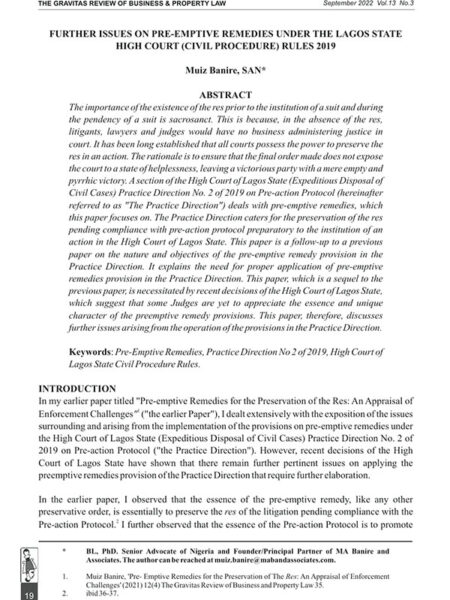
Further Issues on Pre-Emptive Remedies Under the Lagos State High Court (Civil Procedure) Rules 2019
0₦2,500.00Dr Muiz Banire SAN, Principal Partner of MA Banire and Associates, in his article, Further Issues on Pre-Emptive Remedies Under the Lagos State High Court (Civil Procedure) Rules 2019, notes the importance of the existence of the res prior to the institution of a suit and during its pendency. He explains that all courts possess the power to preserve the res in an action. The rationale is to ensure that the final order does not expose the court to a state of helplessness, leaving a victorious party with a mere empty and pyrrhic victory. A section of the High Court of Lagos State (Expeditious Disposal of Civil Cases) Practice Direction No. 2 of 2019 on Pre-action Protocol deals with pre-emptive remedies. Dr Banire, in the article, which is a sequel to the one published by The Gravitas Review in December 2021, explains the need for a proper application of preemptive remedies provision in the Practice Direction. He examines recent decisions of the High Court of Lagos State, which suggest that some Judges are yet to appreciate the essence and unique character of the preemptive remedy provisions.
-
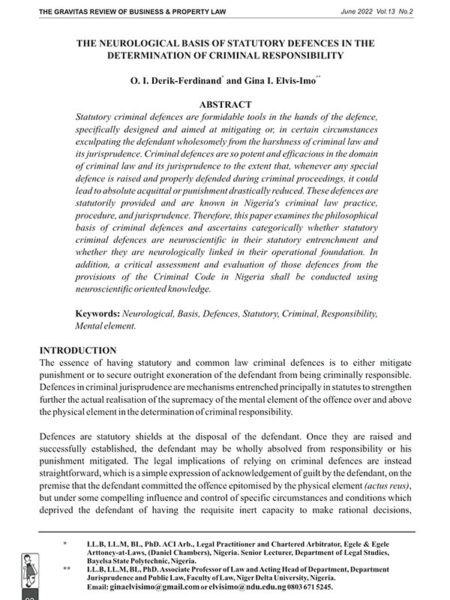
The Neurological Basis of Statutory Defences in the Determination of Criminal Responsibility
0₦2,500.00Dr O. I. Derik-Ferdinand, Senior Lecturer, Department of Legal Studies, Bayelsa State Polytechnic and Dr Gina Elvis-Imo, Acting Head of Department, Department of Jurisprudence and Public Law Niger Delta University, in their paper, The Neurological Basis of Statutory Defences in the Determination of Criminal Responsibility, explain that statutory criminal defences are formidable tools in the hands of the defence, specifically designed and aimed at mitigating or, in certain circumstances exculpating the defendant wholesomely from the harshness of criminal law. Derik-Ferdinand and Elvis-Imo examine the philosophical basis of criminal defences and ascertain whether statutory criminal defences are neuroscientific in their statutory entrenchment and whether they are neurologically linked in their operational foundation. In addition, they assess and evaluate the criminal defences from the provisions of the Criminal Code in Nigeria.
-
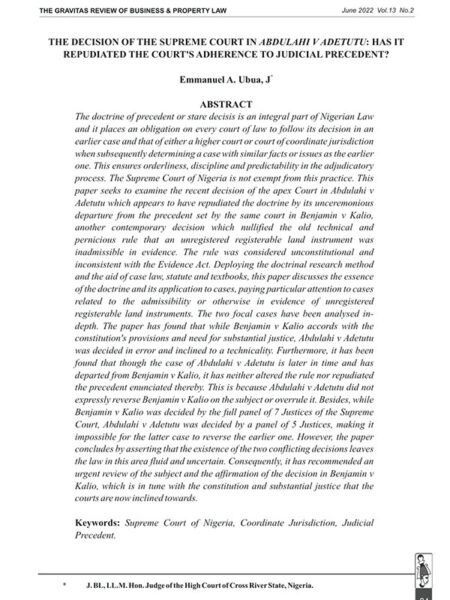
The Decision of The Supreme Court in Abdulahi v Adetutu: Has it Repudiated the Court’s Adherence to Judicial Precedent?
0₦2,500.00Honourable Justice Emmanuel Ubua of the High Court of Cross River State, in his article, The Decision of The Supreme Court in Abdulahi v Adetutu: Has it Repudiated the Court’s Adherence to Judicial Precedent? examines the decision of the Supreme Court in Abdulahi v Adetutu which appears to have repudiated the doctrine of stare decisis by its unceremonious departure from the precedent set by the same court in Benjamin v Kalio. The Supreme Court in Kalio nullified the old technical and pernicious rule that an unregistered registerable land instrument was inadmissible in evidence. The rule was considered unconstitutional and inconsistent with the Evidence Act. However, in the case of Abdulahi v Adetutu which was decided later, the Supreme Court seems to have somersaulted when it held that an unregistered instrument was inadmissible in evidence for breaching provisions of the Land Instruments Registration Law. Hon Justice Ubua comprehensively reviews the cases of Kalio and Adetutu and posits that while Kalio accords with constitutional provisions and the need for substantial justice, Adetutu was decided in error and inclined to technicality. Hon Justice Ubua recommends an urgent affirmation of the decision in Kalio, which is in tune with the constitution and substantial justice.
The Gravitas Review of Business & Property Law



